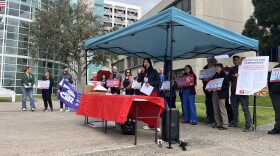Updated at 4:59 p.m. ET
The Food and Drug Administration has given emergency use authorization to the antiviral drug remdesivir to treat hospitalized patients with the coronavirus, President Trump on Friday told reporters at the White House.
Gilead CEO Daniel O'Day said remdesivir maker Gilead Sciences is donating 1.5 million vials of the drug and will work with the federal government to distribute it to patients in need.
The news comes days after preliminary results from a study of the drug showed it can help patients recover faster. Dr. Anthony Fauci, director of the National Institute of Allergy and Infectious Diseases, hailed the findings earlier this week as "quite good news."
The authorization means remdesivir can be distributed in the U.S. and given intravenously to treat COVID-19 patients — both adults and children — who are hospitalized with severe disease, the FDA says. The agency defines that category as "patients with low blood oxygen levels or needing oxygen therapy or more intensive breathing support such as a mechanical ventilator."
Discussing the findings about the drug's ability to help COVID-19 patients, O'Day cautioned earlier Friday that remdesivir is used to treat advanced cases, in which people are already hospitalized. The recent positive findings, he said, are a starting point in the fight against the respiratory disease.
"We want to continue to see how we can expand remdesivir to more patient populations," O'Day said on NBC's Today show. "Clearly with other medicines and vaccines to come, this is part, I think — the beginning of our ability to make an impact on this devastating virus."
Copyright 2020 NPR. To see more, visit https://www.npr.org.






